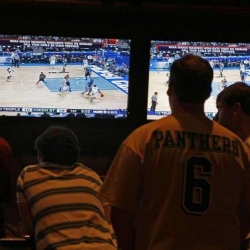Connecticut Governor Dannel P. Malloy said “it’s possible” he might sign a sports betting legalization bill, if the state’s lawmakers consider a special legislative session to push through such a bill. For months, there has been speculation whether Gov. Malloy could reach an agreement with lawmakers on the right framework for sports betting.
The state of Connecticut has two major gambling properties, Mohegan Sun and Foxwoods Casino. Any sports betting deal has to work for the state’s two tribal gaming entities. Any outside operators taking a stake in Connecticut sports betting would have to make an arrangement with the Mohegan and Mashantucket Pequot tribes.
This past week, Dannel Malloy briefed Connecticut lawmakers on the two tribes’ negotiations with sports betting companies. While the details were limited, Malloy suggested that Mohegan Sun and Foxwoods might be in contact with sports betting companies to partner on land-based, online, and mobile sportsbooks.
Connecticut Sports Betting Negotiations
Connecticut lawmakers have to proceed more carefully than other states. The U.S. Supreme Court legalized sports betting in all 50 states by striking down the Professional and Amateur Sports Protection Act (PASPA) on May 14, clearing the way for US states to legalize sports betting.
For most states, that makes legalization of sportsbooks simple. Connecticut has complicated revenue sharing arrangements with Mohegan and Mashantucket Pequot tribes. If the legislature is not careful, it could legalize gaming which could nullify Connecticut’s lucrative revenue sharing agreements.
How Tribal Sportsbooks Differ
Sports betting is more complicated for tribal casinos than it is for commercial casinos. Tribes are given the right under the 1988 Indian Gaming Act to host casinos even in states which do not want casino gambling, because tribal reservations are seen as sovereign soil.
The tribe has to come to a gaming compact with the state its reservation is in, but the state cannot charge more than the cost of regulation — under normal circumstances. If a state gives a tribal casino special concessions — monopolies in an area or an entire state — then the state is allowed to negotiate higher taxes from the tribe.
A state and a tribe simply negotiating a sportsbook law is complicated by a couple of factors. The sports betting law has to change the terms of the gaming compact. Also, the tribe cannot give away its sovereignty rights. The negotiations are bound to be more complicated.
Bureau of Indians Affairs Decision
Connecticut’s case is further complicated by the vaguely malicious behavior of the U.S. Department of the Interior under Ryan Zinke. The Interior Department’s Bureau of Indian Affairs is supposed to approve any new gaming compacts a state and a tribe enters upon. The two sides agree on the gaming compact, then submit it to the Interior Department, which has 60 to 90 days to approve or reject.
In the case of the East Windsor satellite casino being built as a joint venture between Mohegan Sun and Foxwoods Casino, the two sides have waited the better part of a year for approval from the Interior Department. Ryan Zinke will not give an answer, and will not give a reason why he will not give an answer.
Zinke Favors MGM Springfield
It was revealed that Zinke took meetings with lobbyists for MGM Resorts, which has a casino opening later this year 30 miles down the road in Springfield, Massachusetts. The reason the East Windsor casino was being built was to keep Hartford-area gamblers in-state, so they would not go to the MGM Springfield.
Foxwoods and Mohegan Sun have charged the Interior Department with slow-rolling its approval for the East Windsor casino to support the commercial casino operators over the tribal casino operators. Whether the charge has merit or not, Ryan Zinke is not doing his duty in the proper ethical way.
If Connecticut comes to an agreement with Foxwoods and Mohegan Sun, it presumably also would need the approval of the US Department of the Interior. Whether it would be rendered in a timely fashion is anyone’s guess.
Martin Looney on Special Session
Democratic Senate President Martin Looney said he was open to the idea of a special legislative session, but his decision would come down to “the end result of Malloy’s discussions” with the two Connecticut tribes. In the coming weeks, Gov. Dannel Malloy will give a further report, but the time for a special legislative session is quickly running out.

